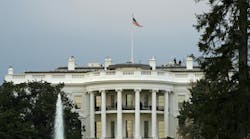Mindful of how politically volatile rising gasoline prices can be in this election year, Congress and the White House are taking preemptive steps to assure voters they have the situation under control.
Some economists say that when oil prices jump from $20/bbl to $30/bbl, it raises the level of the Consumer Price Index (one indicator of inflation) by 1 percentage point and reduces the level of gross domestic product by 0.5% over a year. But as Deutsche Bank analyst Adam Sieminski notes: "The risk is for a larger negative on growth if confidence and financial markets take a big bearish hit."
Proactive stance
Sec. of Energy Spencer Abraham Apr. 11 was scheduled to meet with several oil and gas trade associations to discuss the latest upturn in gasoline prices. Meanwhile, the Democratcontrolled Senate was still struggling with a lumbering 590 page energy reform bill that includes a provision designed to triple ethanol fuel demand within 10 years. Encouraging fuel ethanol is important to both Democrats and Republicans because the gasoline additive is popular in the Midwest, a crucial campaign battleground for the White House and Congress.
Iowa, for example, is an early presidential testing ground for the 2004 elections, and conventional wisdom is that presidential hopefuls need to support ethanol to build campaign momentum. But a more immediate concern for Republicans and Democrats is whether Democrats will maintain their razor-thin majority in the Senate after this November's congressional election cycle. Sen. Tim Johnson (D-SD) is seen as particularly vulnerable to a Republican challenge, and neither party wants to be accused of not doing its best to encourage a domestic "home-grown" fuel, even if farmers represent less than 2% of the US population.
Recognizing those political realities, major oil companies and fuel ethanol interests struck a deal this winter that is now in the pending Senate bill. It streamlines reformulated gasoline (RFG) rules, with the caveat the fuel oxygenate methyl tertiary butyl ether (MTBE) be banned in 2004 and fuel ethanol be given a specific market share of 2.3 billion gal/year, increasing to 5 billion gal/year by 2012. The provision is written broadly, with no requirement that renewables be included in each gallon of gasoline and without restrictions on where renewables can be used (OGJ, Mar. 11, 2002, p. 32).
Ethanol, ANWR
But ethanol mandate opponents want more flexibility transitioning from MTBE to ethanol. Refiners caution that mandating a specific volume of ethanol in 2004 will pit RFG suppliers desperate for supply against other refiners who have to buy credits. East and West Coast markets, where MTBE is being phased out, will be particularly vulnerable, with price spikes as high as $4/gal possible, refiners and terminal operators warn.
Yet such is the political strength of the ethanol-oil compact that it appears unlikely the Senate will dramatically amend the ethanol deal. And now there are some Senate Democrats who fear Republican leaders may feel emboldened enough to call on the "farmers and drillers" coalition to reinject interest in Arctic National Wildlife Refuge coastal plain leasing.

